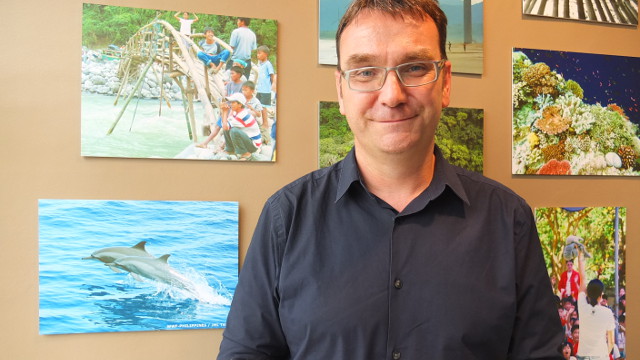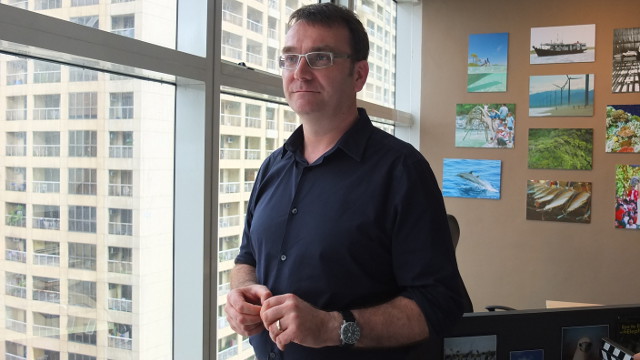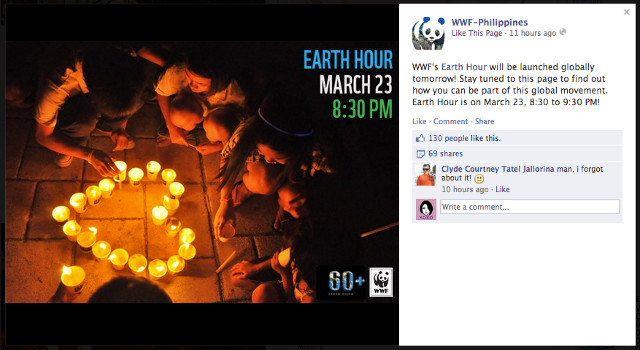SUMMARY
This is AI generated summarization, which may have errors. For context, always refer to the full article.
MANILA, Philippines – Andy Ridley looks like your average friendly Caucasian guy, cracking jokes and making interesting conversation while savouring a lunch of lasagna.
But Andy Ridley is also the reason why millions of people all over the world turn off their lights on a particular March night.
He co-founded Earth Hour.
This year, this global “lights out” event spearheaded by World Wide Fund for Nature (WWF) will happen in various cities in the Philippines on March 23 from 8:30 to 9:30pm.
Andy was in Manila last February 21 to declare his “I Will If You Will” challenge as part of the global Earth Hour campaign.
Small beginnings
Andy’s ordinariness and the massiveness of the Earth Hour movement is a good metaphor for what Earth Hour is really about: ordinary individuals doing ordinary things to make an extraordinary impact on the world.
The first Earth Hour took place on March 31, 2007 at 7:30pm in Sydney, Australia.
According to Andy, the point then was to engage the “60% mainstream of the public who aren’t engaged” in the climate change discussion. At the time, then Australian Prime Minister John Howard refused to introduce environmental reform without international agreement on climate change.
Andy first got the idea of a “lights out” movement from an online story about Bangkok authorities asking citizens to turn off their power due to fuel shortage.
It was the central idea and symbolic gesture that he knew would spread the message faster and more effectively.
Based on polls, 50% of Sydney residents participated and the amount of energy saved during the partial blackout was around 10% of normal usage, not bad for a first time.
In 2012, Earth Hour boasted of 7,000 participating cities and 152 countries.
This generous turn-out proves, at least, that the “first stage” of what Ridley wants for Earth Hour has been reached.
This first stage, according to Andy was, “symbolic. The first stage is asking ‘Does anyone care in the first place?’”
Going beyond the hour
With the number of Earth Hour events happening in the world every year, Earth Hour must now move on to the second stage.
“What we really tried to start pushing last year was ‘how do you go beyond the hour?’” said Andy.
“So the first stage is symbolic. The second one is, okay, people will do stuff for the hour, but will they do more?”
The “I Will If You Will” (IWIYW) campaign dares people to do more.
A visit to the IWIYW page on the Earth Hour website reveals the many IWIYW challenges posted by politicians, celebrities, and ordinary citizens.
European Commissioner for the Environment Janez Potocnik promises to sing onstage if 1,000 people will stop using their cars for at least one week.
Athlete and TV personality Marc Nelson vows to kiteboard wearing a panda hat if 1,000 people will reuse reusable tumblers.
On the site, you can accept the challenge by clicking on a tab or making your own.
A model with gorgeous curly hair says she will shave it all off if 30,000 people will participate in Earth Hour. As of writing, 21,875 have accepted her challenge.
Pedro Felipe Gomez Bonilla’s challenge is less drastic but not less impactful: he promises to not use his iPod for two days if 10,000 people will unplug their mobile chargers after full charge. So far, 6,755 people have accepted his challenge.
‘I dare you’
The IWIYW component of Earth Hour is essential in making the movement more sustainable and long-term.
Andy said, “We start with not just turning the lights off but with trying to change the world even if in a tiny way, even if it’s my world or the world of my family. The aggregation of all these actions is actually quite phenomenal.
“If 10,000 people stop using plastic bags in 10 years, that’s around 36 million plastic bags.”
It also makes people more invested in saving the environment, empowering them to call the cause their cause.
“The ‘I Will If You Will’ campaign is the start, in the citizen-level, of how you get lots of these stories, whether it’s a kid planting a tree or changing light bulbs in your classroom, or like the big result we’ve got in Russia and Uganda,” said Andy.
He was referring to two major examples that proved that the IWIYW campaign is more than just a glorified gimmick:
In Russia, 123,000 people signed a petition for the creation of a law protecting seas from oil pollution. The bill made its way to parliament where it was debated and eventually passed in December 2012.
The call for petition signatures began as an “I Will If You Will” challenge involving Russian celebrities, politicians, and personalities. The CEO of WWF Russia had to fulfil his promise of swimming in Arctic waters after the petition went through.
In Uganda, WWF Uganda dares African businesses, citizens and groups to plant 500,000 indigenous trees in 2,700 hectares of degraded land to fight against deforestation.
Standard Chartered Bank-Uganda has already committed to plant 250,000 trees for the “Earth Hour Forest.” Ugandan Minister for Water and Environment Ephraim Kamuntu has personally pledged to plant 10,000 trees.
Breaking down climate change
Playful, fun, and positive, the IWIYW challenge is also a practical strategy that helps people relate to the abstract and enormous issue of climate change.
“How do you get change in the sense that everyone can do something?” asked Andy.
“These issues are so big. The biggest difference from when we started Earth Hour and now is that then, people were talking about climate change but it was still quite a distant, doesn’t-touch-my-life thing. Whereas now, it doesn’t matter where you are in the world — I bet you you know someone who is now directly affected by climate change.”
Aside from the number of people who click “accept challenge” on their website, Ridley admitted that WWF has no method or system for tracking down the people who have fulfilled the dares.
But that is not the point.
“It’s not a corporate-scaled operation where we get that kind of data. But you try to get to the position where it becomes the norm to talk about it. Just like Earth Hour, it’s an excuse to lean over the fence and talk to your neighbor about these issues,” explained Andy.
“Now, you can do more than talk about lights out, you can ask, ‘Did you accept Andy’s challenge, Mikee’s challenge, your challenge?’”
Far from being concerned with number-crunching, Earth Hour and “I Will If You Will” value quality over quantity.
“One of the big lessons we learned from IWIYW last year was that big numbers aren’t really the important thing. Hopefully, 10,000 people will accept the challenge but, actually, the power of it wasn’t the number.
“The power of it is if I can get my two best mates to do something. It’s more powerful because it’s a direct relationship,” said Andy.
Earth Hour and the “I Will If You Will” campaign call on global citizens to make ending climate change their own commitment, their own dare, their own challenge.
A million accepted challenges might just save the world. – Rappler.com
Add a comment
How does this make you feel?



There are no comments yet. Add your comment to start the conversation.